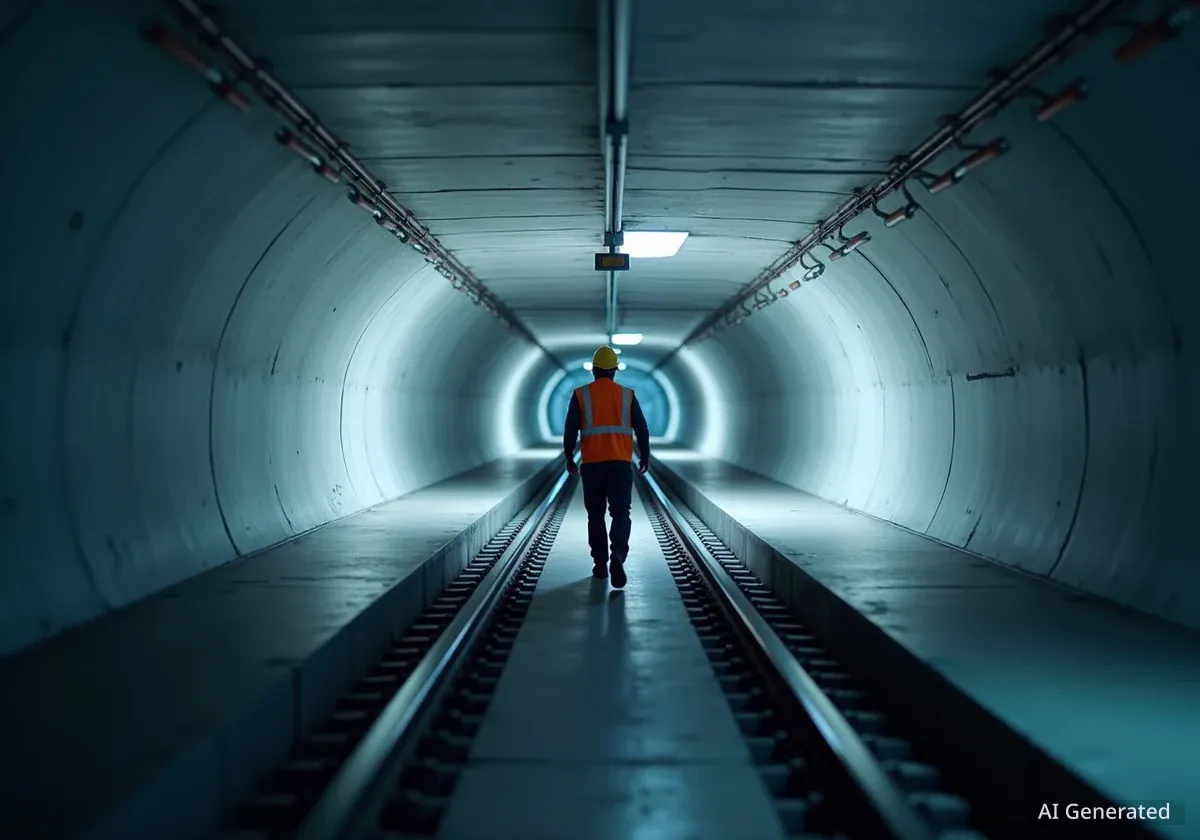An underground transit system developed by Elon Musk’s Boring Company is scheduled to begin operations in Dubai in 2026, according to a United Arab Emirates government official. The project, known as the Dubai Loop, aims to address the city's growing traffic congestion with a high-capacity tunnel network.
The initial phase of the system will feature 17 kilometers of tunnels and is designed to transport up to 20,000 passengers per hour. This development marks a significant step for the tunneling venture and is part of Dubai's broader strategy to implement futuristic transportation solutions.
Key Takeaways
- The first phase of the Dubai Loop is expected to be operational by the second quarter of 2026.
- The initial 17-kilometer network is designed to carry 20,000 passengers an hour.
- This project is a key part of Dubai's strategy to alleviate traffic congestion from its growing population.
- The UAE is also advancing its technological infrastructure with major AI projects, including OpenAI's Stargate and significant Nvidia chip acquisitions.
Project Details and Timeline
The announcement provides a clear timeline for a project first revealed in February 2025. The partnership between the UAE government and The Boring Company aims to create an efficient solution for urban mobility in one of the world's fastest-growing cities.
Omar Al Olama, the UAE Minister for Artificial Intelligence, confirmed the target launch date in a recent interview. He stated that the initial system is just the beginning of a larger transportation network planned for the city.
"The first loop is going to be operational, we’re hoping, by the second quarter of 2026," Al Olama said, providing the first official timeline for the project's public launch.
While the first phase focuses on a 17-kilometer stretch, the minister indicated that the long-term vision is much more expansive. According to Al Olama, the Dubai Loop will eventually include "multiple loops" to serve a wider area of the city, though a timeline for these subsequent phases has not been disclosed. The cost of the project has not been made public.
A Test for The Boring Company
If the Dubai Loop launches as scheduled, it will represent a major milestone for The Boring Company. To date, the company's only fully public and operational system is the Las Vegas Convention Center Loop. That system uses standard Tesla vehicles with human drivers to shuttle passengers between stations, a simpler implementation than some of the company's more ambitious concepts.
Addressing Urban Congestion
The primary driver for the Dubai Loop is the city's rapid population growth and the resulting strain on its existing road infrastructure. Dubai has long been a hub for innovative and large-scale projects, and the underground loop fits into its strategy of adopting advanced technology to solve civic challenges.
This project is not an isolated effort. Dubai is also exploring other futuristic transport options, including air taxi services. The city has already unveiled pilot programs with several companies, including California-based Joby Aviation Inc. and its Chinese competitors, to develop an aerial mobility network.
System Capacity and Scope
- Initial Length: 17 kilometers (10.6 miles)
- Passenger Capacity: 20,000 people per hour
- Launch Target: Q2 2026
- Future Plans: Expansion to a multi-loop network
The mode of transport within the Dubai Loop tunnels remains unconfirmed. The Boring Company has previously proposed various concepts, including autonomous electric vehicles, high-speed vacuum pods, and multi-passenger shuttles. It is not yet clear if the system will rely on Tesla cars, as seen in Las Vegas, or a different type of vehicle.
UAE's Broader Tech Ambitions
The Dubai Loop is a component of the UAE's larger ambition to become a global leader in technology and artificial intelligence. The country has actively pursued partnerships and investments to build a robust digital infrastructure, often supported by light-touch regulation designed to attract innovation.
Major AI Infrastructure Projects
In addition to transportation, the UAE is making significant investments in AI data centers. In May, it was announced as the first location outside of the United States for OpenAI’s Stargate project. This initiative involves the development of a five-gigawatt AI data center in collaboration with Oracle Corp. and other partners.
To power these ambitions, the country has been securing access to high-performance computing hardware. Al Olama confirmed that the UAE expects to receive its first shipment of high-end AI chips from Nvidia Corp. before the end of the year. This hardware is critical for training and running advanced AI models.
"[An upcoming shipment would be] one of the stepping stones for the Stargate project," the minister explained, linking the hardware acquisition directly to the country's strategic AI goals.
This development follows reports that U.S. officials recently approved the export of several billion dollars' worth of advanced chips to American companies operating in the UAE, signaling a strong bilateral partnership in the technology sector.
Musk's Growing Presence in the Gulf
The Dubai Loop is one of several ventures by Elon Musk's companies in the Gulf region. His satellite internet company, Starlink, has also been expanding its presence, recently striking a deal with Saudi Arabia to provide terminals in the kingdom.
Musk has also reportedly pitched other Boring Company projects and robotaxi services in Saudi Arabia, indicating a strategic focus on the region for his various technology enterprises. The successful launch of the Dubai Loop could pave the way for further large-scale infrastructure projects in the Middle East.
Despite the ambitious timeline, The Boring Company has faced internal changes, including the departure of its lead architect in September, as reported by Bloomberg. The successful and timely delivery of the Dubai project will be closely watched as a measure of the company's capability to execute complex international projects.





